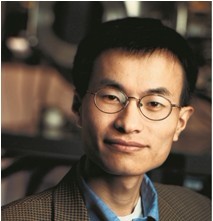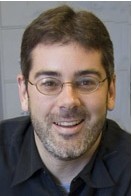演讲主题: Semiconductor Nanowire Building Blocks
时间:2012年2月21日 14:00- 17:00
地点:中科大苏州研究院 行政楼附楼二楼报告厅
专家简介:
Peidong Yang received a B.S. in chemistry from University of Science and Technology of China in 1993 and a Ph.D. in chemistry from Harvard University in 1997. He did postdoctoral research at University of California, Santa Barbara before joining the faculty in the department of Chemistry at the University of California, Berkeley in 1999. He is currently professor in the Department of Chemistry, Materials Science and Engineering; and a senior faculty scientist at the Lawrence Berkeley National Laboratory. He is the Department Head, North Site Director of the Joint Center for Artificial Photosynthesis (JCAP) at LBNL. He is the deputy director for the Center of Integrated Nanomechanical Systems. Yang is an associate editor for Journal of the American Chemical Society and also serves on editorial advisory board for number of journals including Acct. Chem. Res. and Nano. Lett. He was the founder of the Nanoscience subdivision within American Chemical Society. He has co-founded two startups Nanosys Inc. and Alphabet Energy Inc. He is the recipient of MRS Medal, Baekeland Medal, Alfred P. Sloan research fellowship, the Arnold and Mabel Beckman Young Investigator Award, National Science Foundation Young Investigator Award, MRS Young Investigator Award, Julius Springer Prize for Applied Physics, ACS Pure Chemistry Award, and Alan T. Waterman Award. According to ISI (Thomas Reuters), Yang is ranked as No. 1 in materials science and No. 10 in chemistry for the past 10 years based on average citation per paper. He was recently elected as MRS Fellow. His main research interest is in the area of one dimensional semiconductor nanostructures and their applications in nanophotonics and energy conversion.
演讲主题: Carbon Dioxide Capture in Metal-Organic Frameworks
时间:2012年2月21日 14:00- 17:00
地点:中科大苏州研究院 行政楼附楼二楼报告厅
专家简介:
Jeffrey R. Long was born in Rolla, Missouri, USA in 1969. He received his B.S. in Chemistry from Cornell University in 1991, and Ph.D. in Chemistry at Harvard University in 1995. Following postdoctoral work at Harvard and the University of California, Berkeley, he joined the faculty at Berkeley in 1997, where he is currently Professor of Chemistry. He is also a Faculty Senior Scientist in the Materials Sciences Division of Lawrence Berkeley National Laboratory. Research Corporation Research Innovation Award (1998); Hellman Family Faculty Award (1999); Camille Dreyfus Teacher-Scholar Award (2000); Alfred P. Sloan Research Fellow (2001-2003); Wilson Prize (Harvard University, 2002); TR100 Award (2002); National Science Foundation Special Creativity Award (2003-2004 and 2009-2011); National Fresenius Award (2004). His research involves the synthesis of new inorganic clusters and solids, with emphasis on magnetic and microporous materials. His aim is to develop general methods for directing the formation of inorganic clusters, solids, and molecules, particularly as a means of influencing the physical properties and reactivity of such materials. His group uses a variety of techniques, including air-free synthesis, solid-state synthesis, X-ray crystallography, spectroscopy, SQUID magnetometry, and gas sorption analysis.
演讲主题: Molecular catalysts for generating hydrogen from water
时间:2012年2月21日 14:00- 17:00
地点:中科大苏州研究院 行政楼附楼二楼报告厅
来访人员简介:
Christopher J. Chang is an Associate Professor of Chemistry and HHMI Investigator at UC Berkeley as well as a Faculty Scientist in the Chemical Sciences Division of Lawrence Berkeley National Laboratory. He received his B.S. and M.S. degrees from Caltech in 1997, working with Prof. Harry Gray. After spending a year as a Fulbright scholar in Strasbourg, France with Dr. Jean-Pierre Sauvage, Chris received his Ph.D. from MIT in 2002 under the supervision of Prof. Dan Nocera. He stayed at MIT as a postdoctoral fellow with Prof. Steve Lippard and then began his independent career at UC Berkeley in Fall 2004. Research in the Chang lab is focused on chemical biology and inorganic chemistry, with particular interests in molecular imaging and catalysis applied to neuroscience, stem cells, cancer, infectious diseases, renewable energy, and green chemistry. His group's work has been honored by awards from the Dreyfus, Beckman, Sloan, and Packard Foundations, Amgen, Astra Zeneca, and Novartis, AFAR, Technology Review, the ACS Cope Scholar Fund, and the Society for Biological Inorganic Chemistry. Most recently Chris was awarded the 2011 Harvard Wilson Prize and the 2012 ACS Eli Lilly Award in Biological Chemistry.
